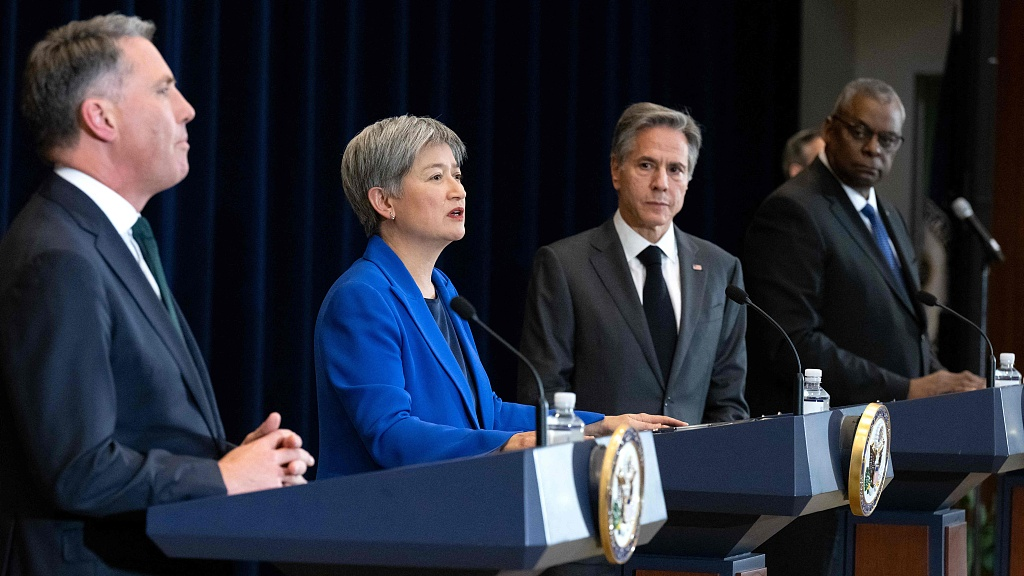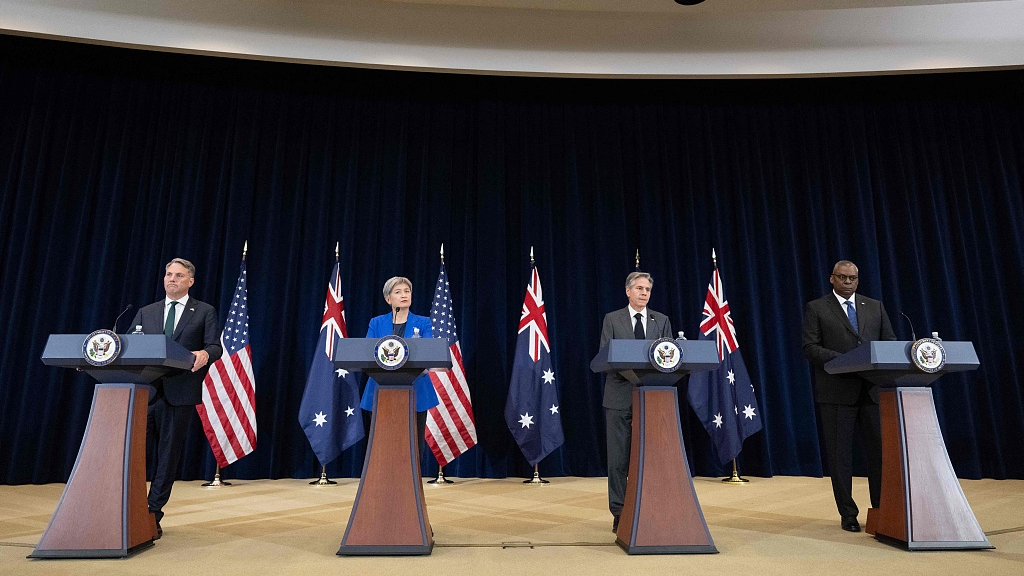
Australian Deputy Prime Minister and Minister for Defence Richard Marles (L), Australian Foreign Minister Penny Wong (2nd L), U.S. Secretary of State Antony Blinken (2nd R) and U.S. Secretary of Defense Lloyd Austin hold a press conference during the 32nd annual Australia - U.S. Ministerial (AUSMIN) consultations at the State Department in Washington, the U.S., December 6, 2022. /VCG
Australian Deputy Prime Minister and Minister for Defence Richard Marles (L), Australian Foreign Minister Penny Wong (2nd L), U.S. Secretary of State Antony Blinken (2nd R) and U.S. Secretary of Defense Lloyd Austin hold a press conference during the 32nd annual Australia - U.S. Ministerial (AUSMIN) consultations at the State Department in Washington, the U.S., December 6, 2022. /VCG
Editor's note: Hannan Hussain is a foreign affairs commentator and author. He is a Fulbright recipient at the University of Maryland, the U.S., and a former assistant researcher at Islamabad Policy Research Institute. The article reflects the author's opinions and not necessarily the views of CGTN.
Before foreign ministers from the U.S. and Australia convened for the annual AUSMIN (Australia-United States Ministerial Consultations), the countries' defense chiefs set the stage for anti-China allegations. That included a "joint determination" to counter what the Pentagon described as "destabilizing military activities by the People's Republic of China." Such falsehoods are designed to manufacture threat perceptions about Beijing, in order to accelerate militarization and imposition of a "rules-based order" in the Indo-Pacific.
Canberra and Washington have made no secrets of distracting attention away from their accelerated nuclear proliferation efforts, militarization, and U.S troop deployment in Australia. All at the expense of broad-based, credible peace in the region. This is what strikes at the heart of "destabilizing military activities."
Canberra is enlisting urgent U.S. and British support for its procurement of long range and stealth capable nuclear-powered submarines under the controversial "AUKUS" agreement. Their use of conventional weaponry takes the lid off Washington's accusation that China has focused on "coercive" military activities in the region.
The nuclear proliferation push casts a shadow over Australia's hollow concerns over a precarious "strategic landscape" in Asia that demands military initiative. Such conjecture enables proliferation risks and an arms race to the disadvantage of a rules-based order. The China-focused defense alliance would disrupt the "regional security environment."
The U.S. plans to increase the rotational presence of military forces in Australia, including bomber task forces and fighters, is a direct threat to enduring regional peace in the Pacific. These commitments deserve to be called-out when the increased U.S. naval and army presence has been justified in the name of "future peace and security." That pretext speaks to a broader pattern of U.S.-Australian interference across the South China Sea and the Taiwan Strait, both advanced by using China as a threat rationale.

Australian Deputy Prime Minister and Minister for Defence Richard Marles (L), Australian Foreign Minister Penny Wong (2nd L), U.S. Secretary of State Antony Blinken (2nd R) and U.S. Secretary of Defense Lloyd Austin hold a press conference during the 32nd annual AUSMIN consultations at the State Department in Washington, the U.S., December 6, 2022. /VCG
Australian Deputy Prime Minister and Minister for Defence Richard Marles (L), Australian Foreign Minister Penny Wong (2nd L), U.S. Secretary of State Antony Blinken (2nd R) and U.S. Secretary of Defense Lloyd Austin hold a press conference during the 32nd annual AUSMIN consultations at the State Department in Washington, the U.S., December 6, 2022. /VCG
If the China obsession proves anything, there is nothing "bilateral" about the interests that bind Australia and U.S. together at present. The Pentagon wants the world to believe that the U.S.-Australia alliance is "the strongest that it has ever been." Yet, escalating U.S. military presence, nuclear proliferation risks, and blatant containment tactics should compel powers in Asia to resist such a Cold War mentality in the region. There's an effort to disrupt the regional order and push the determinants of their inclusive regional security on the back burner.
Very recently, Washington sought to distort China's legitimate concerns over AUKUS, and the proliferation risks it poses. Yet, many of these concerns were in line with regional skepticism over the nuclear submarine arrangement. Canberra's resolve to expedite the arrangement, and move towards the direction of nuclear proliferation risks, removes all doubt about the real sources of long-term aggression.
Rather than prompting a hard look at the alliance's ominous trajectories, the U.S. focuses on a groundless excuse of Chinese "pressure tactics" against Canberra. "Australia is no stranger to such efforts, and we reaffirm that we would stand with him against these pressure tactics," said U.S. Secretary of State Antony Blinken during a press conference.
The anti-China rhetoric takes exception to Canberra and Washington's forced imposition of a "rules-based" order in the Pacific, and new coercive military strategies that bring their credibility into question.
Ultimately, history has time and again informed us about the dangers of Washington's Cold War mentality towards China. It has illuminated the zero-sum nature of military escalations, and how this only ends one way. Take away the Australia-U.S. defense alliance's obsession over Beijing, and its endurance begins to cease.
(If you want to contribute and have specific expertise, please contact us at opinions@cgtn.com. Follow @thouse_opinions on Twitter to discover the latest commentaries on CGTN Opinion Section.)